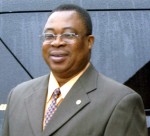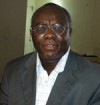All over the world, politicians do all they can to draw support from diverse constituencies, especially the religious community. So is it in Ghana too. However, the impact of any support from the religious community is felt on Election Day, not after it. Whether the religious community can help a politician win power or not doesn’t come after the fact. Not so in Ghana for Akufo-Addo and his NPP.
I continue to marvel at the extent to which the NPP is desperately fixated on exploiting religious fervour in pursuit of its political aspirations, especially at a time that its sad fate at Election 2012 has already been sealed and President Mahama continues to consolidate his hold on power.
The news is that a “blood sacrifice” has been done for its Akufo-Addo and prayers offered to God to help him win the Election 2012 Petition now before the Supreme Court so that he can become Ghana’s President.
According to the report on the ceremony, Mallam Olu led the prayers at the Nasariyya Mosque at Aboabo Number Two in Kumasi, which were “intermittently laced with recital of the Holy Qur’an”. Then, a fat sheep (should it not have been a RAM instead?) was slaughtered at the forecourt of the mosque and the meat distributed to the people to thank Allah for His mercy.
The event was sponsored by Dr. Amoako Tuffuor, a leading member of NPP. We are told that Nana Antwi, the defeated NPP parliamentary candidate for Asawase, and other influential officials in the Ashanti Region graced the occasion. So also did ardent NPP members at Asawase and other parts of Kumasi.
There we go, folks. The odd admixture of religion and politics is in full view. And a “blood sacrifice” to confirm it! The big picture is clear: exploitation of Muslim religious fervour on this occasion, which worries me—and must worry all others too—for what it portends. Is someone cunningly exploiting religion to set up a time-bomb?
My study of “Qur’anic Hermeneutics” and the “Hadiths/Sunna of the Prophet Muhammad” in courses on “Religious Studies” in my undergraduate studies at the University of Cape Coast taught me a lot to admire about Islam.
No wonder, in a national essay competition conducted by the Iranian Embassy in Ghana in 1998, I won the third prize, which amazed the organizers because I was a Christian, not a Muslim to persuade them in my essay on “The significance of the Hajj”.
I have just blown my own horn to launch my examination of why I consider the exploitation of the religious fervour of the Muslim community for petty political jingoism is not only dangerous but is also an extreme instance of desperation on the part of Akufo-Addo. By this statement, I don’t mean to suggest that it is only Muslims who can be exploited to this extent; but I have a good cause for zeroing in on this area, considering what I have noticed unfolding.
I know much about Islam and its underpinnings as far as its precepts, injunctions, and prohibitions concerning the totality of human existence are concerned.
I know also that when unsuspecting religious zealots become politically proselytized, they constitute a huge burden for the system. If you doubt my claim, look no further than the involvement of the Boko Haram terrorist group in Nigeria in politics.
Of course, we acknowledge the fact that in politics, numbers count; and any politician who has eyes to see and ears to hear what is doing the rounds will snatch at any opportunity to snuggle to potential voters.
We also acknowledge the strategy used by the NPP in its outreach programme to capitalize on the religious fervour of the people. That was why the party’s leaders spread their tentacles far to reach the two main religious communities in Ghana—Christian and Muslim.
At a larger level, narrowing this outreach to the Christian and Muslim segments of the Ghanaian populace and exploiting their religious fervour this way has its disadvantages, probably one of which might have influenced heavily the electoral decision made by voters not subscribing to Christianity or Islam.
In all their outreach efforts, the Akufo-Addo camp has been silent on how to deal with adherents of the African Traditional religions that constitute a huge chunk of the Ghanaian citizenry. Whether they reach out to them “Nicodemously” or not can’t be confirmed; but the obvious silence on how the NPP relates to such elements can’t be missed.
Are they saying that they don’t need the electoral advantage from these African Traditional religionists? Why are they also not the focus of their attention?
You see, because they have skewed their outreach efforts to sideline those sections of the religious community, they can’t appeal to their conscience for votes. And in democracy, numbers count. So, there is a dark side to all that has been happening; and the NPP is paying a big price at that front. Any doubt?
Indeed, as I have said several times and will continue to say, God is not in the habit of coming down from the heavens to help men solve their problems of existence. He has already endowed us with the faculty to know how to handle our affairs and live our lives before we account for our stewardship when he calls us unto himself.
That is why it is important to know that physical problems must be solved physically and spiritual ones, spiritually. The general elections are not spiritual problems. They are physical issues. Prayers are good for whatever they are but it takes more than mere prayers to win general elections. What is happening now (after the elections have been held and the results declared) is misplaced. The time for prayers is long gone, if anything at all.
More importantly, if prayers can redeem Akufo-Addo, why is he in London to have a “routine medical check-up” instead of sitting back in Ghana to be prayed for or to pray for himself to know what is happening in his system? His is a physical problem, which is why he has dashed off to see his doctor in London; not so? If prayers were enough to tackle such a physical problem, why hasn’t he sat back to pray for relief?
Voting is a physical act, not a spiritual one to warrant this flight into the transcendental. So is it with the election petition that he has placed in the dark chambers of the Supreme Court.
That problem is a physical problem, which no amount of wailing, gnashing of teeth, sacrificing of all manner of animals, or dipping into the River Jordan can solve (with particular reference to Naman’s experience with Prophet Elijah). No amount of howling day and night at prayer-and-fasting sessions can solve that problem.
It is only the physical element (EVIDENCE/FACTS) to be adduced that can determine how the pendulum swings at the end of the Supreme Court’s work. Why then will anybody remain fixated on all these shows of religious fervour?
Indeed, blood sacrifice—or any sacrifice of anything at all to the Supreme Deity or any other spiritual entity—has its implications. It is a ritual that may make or mar one’s aspirations. If you doubt it, read about Cain and Abel and you will realize that in our time, the Cains outnumber the Abels.
What I see happening in the Akufo-Addo camp is nothing but an attempt to force God to undo what he has already done and blessed. Somebody is testing God’s patience and has to beware of the wrath of God!!
More importantly, exploiting the religious sentiments of unwitting people this way is dangerous for the country. Ghana is an oasis of peace and stability in a sub-region of political turmoil and should remain so. That is why I advise the youths, especially, to shy away from politicians desperately seeking their support to achieve their morbid political objectives.
General elections are cyclical and one should adopt the attitude that will not foreclose anything but ensure that a loss in one doesn’t necessarily mean the end of the road. Election 2012 is gone, making room for Election 2016 and beyond. The loss of one animal in the forest doesn’t mean the death of all other animals there.
Those who refuse to accept the fate that Election 2012 wrought for them and are running around in circles—trying to turn every stone to use in challenging reality—are doing nothing but digging their own graves. And we shall help them lie therein.
I shall return…
• E-mail: mjbokor@yahoo.com
• Join me on Facebook at: http://www.facebook.com/mjkbokor
The opinions expressed are the author’s and do not necessarily reflect the views or have the endorsement of the Editorial Board of http://www.africanewsanalysis.com, http://www.africa-forum.net and http://www.wapsfeatures.wordpress.com


